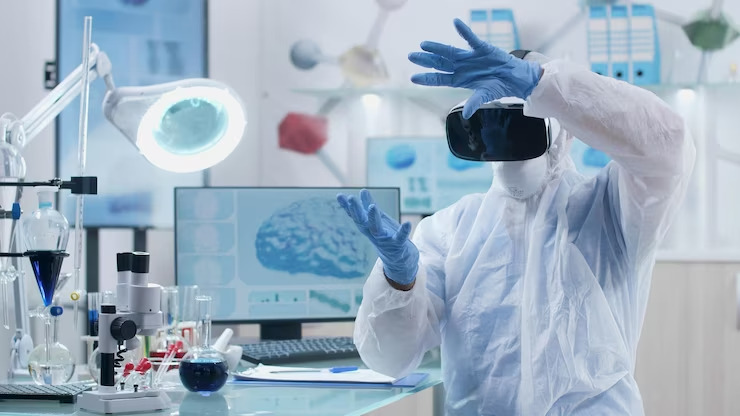Preventive Healthcare
Role of Artificial Intelligence in Lab Technology: How It Is Changing the Landscape
5941 Views
0

May 11th is a significant day for technology enthusiasts in India as it marks National Technology Day. Established in 1999, this day celebrates the successful nuclear tests conducted by India at Pokhran, which displayed the country's technological prowess to the world. Technology has revolutionised every aspect of our lives, from communication to healthcare, education, transportation, finance and more.
AI has brought a new dimension to lab technology by simplifying complex processes and making them more efficient than ever before. In this blog post, we will explore how AI is changing the landscape of laboratory operations, its benefits, challenges and future possibilities.
What Is Artificial Intelligence (AI)?
Artificial intelligence (AI) refers to the simulation of human intelligence in machines that are programmed to learn, reason and perform tasks autonomously. It involves using algorithms, data and mathematical models to enable computers to mimic cognitive functions such as perception, speech recognition, problem-solving and decision-making.
Artificial intelligence represents a significant technological advancement with the power to enhance our lives in ways we cannot yet fully comprehend.
How is AI Being Used in Lab Technology?
AI is revolutionising the field of lab technology by enabling scientists to analyse and interpret large amounts of data quickly and accurately. With AI, labs can now automate manual tasks such as pipetting and sample preparation, freeing up researchers' time for more important work.
One way AI is being used in lab technology is through image analysis. By training algorithms to recognise specific patterns or structures within microscope images, researchers can quickly identify potential areas of interest for further study. This has led to quicker identification of disease biomarkers and drug targets.
Another use case for AI in lab technology is predictive modelling. By feeding large datasets into machine learning models, scientists can predict outcomes with a high degree of accuracy. For example, researchers have used this approach to identify new materials with desirable properties for energy storage applications.
Additionally, AI is helping labs streamline their workflows by optimising experimental design and reducing errors caused by human error or bias. This has the potential to speed up scientific discovery and improve reproducibility across studies.
Benefits of Using AI in Lab Technology
The integration of artificial intelligence into lab technology has brought about several benefits. One significant advantage is the increased accuracy in data analysis and interpretation.
With AI, labs can analyse large sets of data faster than humans while minimizing errors that may occur due to fatigue or human error.
Another benefit of using AI in lab technology is improved efficiency. AI-powered systems can learn from past experiments and results, enabling them to make more accurate predictions about future outcomes. This allows scientists to optimize their workflows, reducing the time and resources required for research.
Moreover, AI can help identify patterns that are not immediately visible to humans. By analyzing vast amounts of data over extended periods, it can easily spot subtle changes that could be missed by a person performing manual observations.
AI reduces the risk associated with handling hazardous materials in laboratories since robots powered by this technology can perform dangerous tasks instead of people.
Challenges of Using AI in Lab Technology
While AI has brought a plethora of benefits to lab technology, it is not without its challenges. One of the biggest challenges is ensuring that the data used to train AI models is representative and unbiased.
If the data is not diverse enough or if there are biases in how the data was collected, then the AI system may make inaccurate predictions or classifications.
Another challenge is making sure that AI systems are transparent and explainable. As these systems become more complex, it can be difficult for researchers and users to understand why they are making certain decisions. This lack of transparency can lead to mistrust in AI technology and hinder its adoption.
Additionally, there are concerns over job displacement as more tasks become automated through AI. It is important to consider how these changes will impact workers in lab settings and what measures can be taken to minimise their negative effects.
Cybersecurity risks must also be addressed when using AI in lab technology. As sensitive information becomes increasingly digitised and accessible through interconnected systems, it becomes easier for hackers to exploit vulnerabilities.
Overcoming these challenges will require collaboration between scientists, engineers, policymakers and other stakeholders involved in developing and implementing AI solutions for lab technology.
Future of AI in Lab Technology
The future of AI in lab technology is very promising. As more labs adopt AI-powered systems, we can expect to see significant advancements in areas such as diagnostics, drug discovery and development.
One area where AI could have a huge impact is in personalised medicine. By analysing patient data and genetic information, AI algorithms could help doctors tailor treatments to individual patients for better outcomes.
Ultimately, the future of AI in lab technology will depend on continued investment in research and development. But with so many exciting possibilities on the horizon, it is clear that this emerging field has enormous potential to transform how we approach scientific research and discovery.
Conclusion
Artificial intelligence has become an essential part of lab technology. With its ability to process vast amounts of data quickly and efficiently, AI is changing the way we conduct research and analyse results. From automating tasks to improving accuracy and reducing errors, AI offers numerous benefits that can help researchers achieve their goals faster. Artificial intelligence will play a critical role in shaping the future of science and research. By embracing this technology responsibly and using it effectively alongside human expertise, Metropolis Labs unlocks new insights into our world that were previously impossible to attain. Connect with us today to know all the tests we offer!























 WhatsApp
WhatsApp